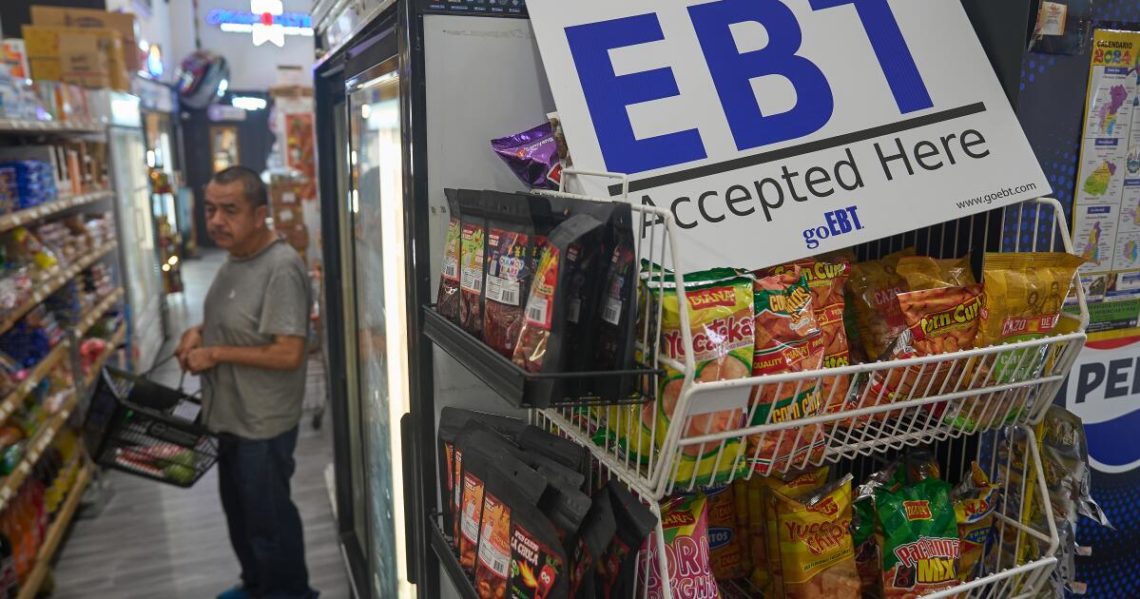Over the weekend, the federal government temporarily shut off funding for its Supplemental Nutrition Assistance Program, or SNAP, leaving more than 42 million Americans uncertain about how they’ll be able to feed their families in the coming weeks. For many older Californians like me, that cutoff isn’t a mere inconvenience. It’s a gut-punch.
I’m now 67 years old, a widow living in Section 8 affordable housing in the Hillcrest area of San Diego. To qualify for my building, residents must be at least 62 years of age and earn less than $58,000 a year — roughly 50% of the area’s median income. Yet my rent still takes about 30% of my income, the standard limit for “affordable” housing. It’s a catch-22 many seniors know well: If we earn too much, we lose assistance; earn too little and we can’t cover basic expenses.
I work part-time as a writer, which gives me purpose and helps me stay active. But even with that income and my monthly Social Security, it’s a struggle. For the past two years, my $194 monthly SNAP benefits have bridged that gap. Without them, I’m not sure how I’ll manage.
Nearly six million Californians are 65 or older as of the last census — about 15% of the state’s population. Recent data show that roughly 9% of older adults in California face food insecurity, meaning as many as half a million seniors statewide struggle to reliably access three nutritious meals a day. In San Diego County alone, more than 182,000 older adults experience food insecurity, and almost 100,000 seniors here receive SNAP or CalFresh benefits. These are not extravagant stipends; the average senior household gets about $188 a month, but those modest funds often mean the difference between skipping a meal and buying a bag of groceries.
Most of my neighbors are in their 70s or 80s. Many are immigrants from Mexico, China and Russia, each bringing rich histories and quiet resilience to our community. Most don’t drive; they take the bus, use walkers or push metal carts to carry groceries. Each Thursday around noon, the LGBTQ Center down the street offers a small selection of food, and once a month they distribute fresh vegetables. At the same center, the Jewish Family Service serves a free weekday lunch. It’s about a half mile each way, and I often see neighbors making that uphill walk, dragging bags of oranges, apples and onions back home. I admire their grit, but I also see how difficult it can be. There’s no way most could reach another food bank across town if these benefits disappear.
Food banks do heroic work, but they can’t fill the gap left by federal cuts. Seniors with diabetes or heart disease often need low-sodium, high-protein foods — items that are expensive and rarely available through mass food giveaways or food bank box programs.
And even when free produce is available, getting it home can be an ordeal for someone in their late 70s with arthritis or limited mobility. The federal government’s decision to suspend SNAP is being defended as “fiscal discipline,” but there’s nothing disciplined about forcing vulnerable people to choose between rent, medicine and food. These programs aren’t charity; they are investments in public health and human dignity.
Research from public health and nutrition experts — including recent studies in the International Journal of Behavioral Nutrition and Physical Activity and the Journal of the Academy of Nutrition and Dietetics — has shown that older adults who maintain consistent nutrition have lower hospital readmission rates and fewer chronic-disease complications, saving taxpayers money in the long run. Yet too often, public policy focuses on short-term budgets rather than long-term health.
I’ve heard people say, “Just get a job.” Many of us already have one. Or two. But working into your late 60s or 70s doesn’t guarantee stability, especially when wages are low, rents are high and retirement savings are meager. Not everyone has a nest egg. Life happens — illness, job loss, caregiving, divorce, unexpected medical bills, or, in my case, the sudden loss of a spouse — and what once felt secure can vanish overnight.
Others may say, “Families should take care of their elders.” Some of us are lucky to have family nearby. Many aren’t. Isolation is one of the quietest epidemics among older adults, and hunger only deepens it. What troubles me most is that seniors have become invisible in this national conversation. Politicians talk about supporting families and especially children — both worthy causes — but rarely about the older Americans who built those families, worked for decades, paid their taxes and now live with dignity on very little.
As benefits are turned off this week, I urge federal policymakers not to forget us. For the sake of millions in California and the U.S., we need to reinstate SNAP immediately and protect it permanently. More than that, remember the faces behind the statistics, the woman with the walker balancing bags of oranges, the widower skipping lunch so his dog can eat, the part-time worker deciding between groceries and gas.
Seniors deserve to eat, to live and to age without fear of hunger. That’s not a privilege; it’s a promise this country once made to its people — a promise that must be kept.
Candice Reed is a journalist whose work has appeared in the New York Times and the San Diego Union-Tribune. She is also the co-author of “Thank You for Firing Me!”
The post Contributor: Don’t forget the seniors as SNAP benefits are cut appeared first on Los Angeles Times.




